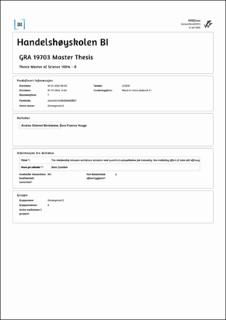The relationship between workplace ostracism and quantitative/qualitative job insecurity: the mediating effect of state self-efficacy
Master thesis
Permanent lenke
https://hdl.handle.net/11250/3040600Utgivelsesdato
2022Metadata
Vis full innførselSamlinger
- Master of Science [1621]
Sammendrag
This master thesis has investigated the relationship between workplace ostracism and both quantitative and qualitative job insecurity, and examined the mediating effect of state self-efficacy on this relationship. With a longitudinal research design and a quantitative self-reported survey, we found significant correlation that (1) workplace ostracism is associated with elevated levels of qualitative job insecurity, (2) workplace ostracism affects state self-efficacy, and (3) state self-efficacy affects qualitative job insecurity. Contrary to our predictions, the indirect effect of state self-efficacy yielded no support. However, due to small margins in the mediation analysis, it is too early to conclude that state self-efficacy is not an explanatory mechanism on the relationship between workplace ostracism and qualitative job insecurity. Moreover, we found no support that (1) workplace ostracism is associated with elevated levels of quantitative job insecurity, and (2) state self-efficacy affects quantitative job insecurity. Thus, our different findings of quantitative and qualitative job insecurity indicate that people are more concerned about losing valued job features and quality in the employment relationship, rather than losing the job itself due to workplace ostracism. Our findings therefore illuminate that loss of resources as a result of workplace ostracism may lead individuals to believe they are unable to perform their jobs properly, resulting in qualitative job insecurity. This thesis implicates the necessity of good workplace ostracism management. We therefore suggest that organizations encourage the development of a healthy work environment defined by mutual support and respect between employees, and that managers ensure that employees' current positions in the team are not jeopardized due to workplace ostracism.
Beskrivelse
Masteroppgave(MSc) in Master of Science in Business, Leadership and Change - Handelshøyskolen BI, 2022
